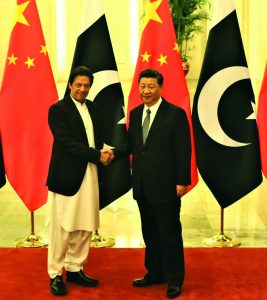 Though it was a howler that the Pakistan government-controlled TV channel (PTV), carried the word “Begging” instead of Beijing while showing Prime Minister Imran Khan address a gathering in the Chinese capital during his recent official visit, the mistake reflected the bitter reality in his country. Khan was there looking for financial assistance to tide over the debt repayment crisis Pakistan is faced with today. The Chinese promised him to help Pakistan with an aid package of 6 billion, which would be released besides what China
Though it was a howler that the Pakistan government-controlled TV channel (PTV), carried the word “Begging” instead of Beijing while showing Prime Minister Imran Khan address a gathering in the Chinese capital during his recent official visit, the mistake reflected the bitter reality in his country. Khan was there looking for financial assistance to tide over the debt repayment crisis Pakistan is faced with today. The Chinese promised him to help Pakistan with an aid package of 6 billion, which would be released besides what China
has been spending through China-Pakistan Economic Corridor (CPEC) projects. However, more negotiations need to be held for Beijing’s aid to reach Islamabad, as Chinese officials indicated to media persons during Khan’s visit.
Earlier, Khan, a cricketer-turned-politician, had visited Saudi Arabian apparently to participate in an international investment conference there, but his real purpose was to approach the Saudis which he did for urgent funds required by cash-strapped Pakistan for clearing its import bills and loan repayments. Khan was obliged by the Saudis, Pakistan’s traditional lenders, with a $6 billion package of assistance. However, it has strings attached: Pakistan must maintain its silence over the journalist Jamal Khashoggi murder controversy and support the Saudis against Iran in the ongoing war for dominance in the Arab world. It would be a tricky job for Pakistan as it has been indicating to maintain its friendly relations with both countries. But Imran Khan needed the funds he got and, therefore, expressed his readiness to review his stand as a bargaining tactic.
Pakistan now has plans to approach the United Arab Emirates (UAE) leadership for financial aid as it does not want to borrow a big amount from the International Monetary Fund (IMF) owing to certain restraining conditions it imposes on borrowers which nobody likes.
However, Pakistan’s financial condition is so critical that even if the UAE obliges it with an aid package, it would be difficult for Islamabad to avoid going to the IMF for a fresh bailout loan.
Obviously, with a view to sending positive signals to the international community, Pakistan Finance Minister Asad Umar has asserted that with the Chinese assurance of the $6 billion aid package, his country’s balance of payments crisis is over, as the situation stands today.
“We had told you about the $12 billion financing gap, of which $6 billion have come from Saudi Arabia, and the rest has come from China. So, the immediate balance of payments crisis of Pakistan has ended. I want to make that clear in unequivocal terms that we do not have any balance of payments crisis now,” Umar told the media the other day.
Yet Pakistan cannot afford to ignore the IMF, which is likely to come to the rescue of Islamabad in this hour of crisis, as it has done earlier too. Though the IMF is under pressure from the US and other Western countries to impose tough conditions on its bailout package, so soon after the IMF completed the payment of an earlier loan in July this year, it cannot refuse to help Islamabad with a view to saving it from slipping into financial chaos which may be exploited by extremist elements to promote their dangerous agenda. In any case, it is generally believed that the loan Pakistan seeks will be used for meeting financial obligations to China, which has created a debt trap through the controversial CPEC project.
According to the figures released by the State Bank of Pakistan, Islamabad’s current account deficit increased by 43 per cent to $18 billion in the fiscal that ended in June 2018. Its foreign currency reserves came down to $8.4 million by the October-end from $627 million in late September. Pakistan is, therefore, faced with a major balance of payment crisis. It can fulfil with great difficulty its foreign debt obligations till the year-end. The public sector debt of Pakistan stands at $75.3 billion, which is 27 per cent of its gross domestic product.
Earlier, the Pakistan Finance Minister had said, “The difficult financial situation that the country is going through, I don’t need to tell anyone about it, everyone knows the crisis the previous government left us with.”
But what happened to Pakistan during the previous government which resulted in this crippling financial crisis? Are Islamabad’s civilian rulers to blame for this ugly scenario or the military dictators who have been running Pakistan either as rulers or from behind the scene?
Most financial experts are of the view that Pakistan’s financial crisis has been caused by reckless spending by its civilian rulers and their failure to effectively curb corruption. But there have other major factors too like terrorism, poor performance on the export front and dwindling remittances from Pakistanis settled abroad.
Extremism and terrorism have created a situation in which foreign investors are scared to set up their establishments there. According to a State Bank of Pakistan report for 2016, the war on terrorism has cost $118 billion to the country’s exchequer. The Global Terrorism Index (2016) says that out of 163 countries, Pakistan stands fourth worst hit by the scourge of terrorism.
Pakistan’s exports declined by 20 per cent during a period of 10 years from 2011 to 2017, according to the World Bank’s lead country economist Enrique Blanco Armas. The reasons are a discouraging business environment, an overvalued exchange rate, relatively weak trade facilitation and poor infrastructure facilities.
These factors could not have led to Pakistan’s foreign exchange reserves declining to an alarming level had there been adequate support from the remittances from its nationals working abroad. But this was unavoidable because of the disturbances in the Middle-East, resulting in lakhs of foreign workers losing their jobs. Over 3.5 lakh Pakistanis lost their jobs in Saudi Arabia alone.
The financial crisis faced by Pakistan has lessons for India too. We must limit our non-productive expenditure and strive to maintain an environment in which foreign direct investors feel encouraged to come and invest their funds without fear of any kind. Populism being indulged in by the NDA government can lead to serious repercussions in the long run.
letters@tehelka.com













